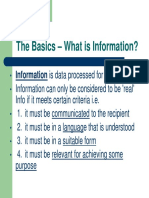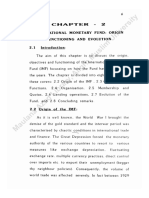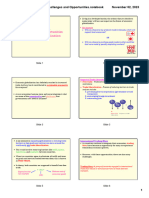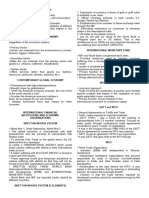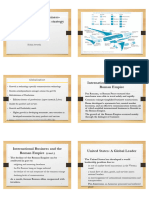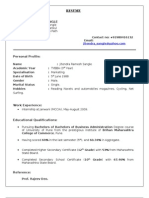0 ratings0% found this document useful (0 votes)
29 viewsLesson 2
Lesson 2
Uploaded by
Ju1. International financial institutions like the IMF and World Bank played key roles in establishing the post-World War 2 global economic system under the Bretton Woods Agreement by maintaining stable exchange rates and providing development funds.
2. Global corporations operate across national borders, connecting resources and opportunities worldwide, and are governed by the laws of their home country. They have significant investments and facilities in many countries.
3. Major international agreements like GATT and later the WTO facilitated global trade liberalization and established rules for trade in both goods and services as well as intellectual property rights.
Copyright:
© All Rights Reserved
Available Formats
Download as DOCX, PDF, TXT or read online from Scribd
Lesson 2
Lesson 2
Uploaded by
Ju0 ratings0% found this document useful (0 votes)
29 views3 pages1. International financial institutions like the IMF and World Bank played key roles in establishing the post-World War 2 global economic system under the Bretton Woods Agreement by maintaining stable exchange rates and providing development funds.
2. Global corporations operate across national borders, connecting resources and opportunities worldwide, and are governed by the laws of their home country. They have significant investments and facilities in many countries.
3. Major international agreements like GATT and later the WTO facilitated global trade liberalization and established rules for trade in both goods and services as well as intellectual property rights.
Copyright
© © All Rights Reserved
Available Formats
DOCX, PDF, TXT or read online from Scribd
Share this document
Did you find this document useful?
Is this content inappropriate?
1. International financial institutions like the IMF and World Bank played key roles in establishing the post-World War 2 global economic system under the Bretton Woods Agreement by maintaining stable exchange rates and providing development funds.
2. Global corporations operate across national borders, connecting resources and opportunities worldwide, and are governed by the laws of their home country. They have significant investments and facilities in many countries.
3. Major international agreements like GATT and later the WTO facilitated global trade liberalization and established rules for trade in both goods and services as well as intellectual property rights.
Copyright:
© All Rights Reserved
Available Formats
Download as DOCX, PDF, TXT or read online from Scribd
Download as docx, pdf, or txt
0 ratings0% found this document useful (0 votes)
29 views3 pagesLesson 2
Lesson 2
Uploaded by
Ju1. International financial institutions like the IMF and World Bank played key roles in establishing the post-World War 2 global economic system under the Bretton Woods Agreement by maintaining stable exchange rates and providing development funds.
2. Global corporations operate across national borders, connecting resources and opportunities worldwide, and are governed by the laws of their home country. They have significant investments and facilities in many countries.
3. Major international agreements like GATT and later the WTO facilitated global trade liberalization and established rules for trade in both goods and services as well as intellectual property rights.
Copyright:
© All Rights Reserved
Available Formats
Download as DOCX, PDF, TXT or read online from Scribd
Download as docx, pdf, or txt
You are on page 1of 3
Lesson 2: Market Integration 3.
Differences in the prices in the
integrated market should be equal
if they are well integrated.
a. International Financial
Institutions A. International Financial
b. Attributes of Global Corporation Institutions
1. Explain the role of international financial • In the International Financial
institutions Institutions, with the Bretton Woods
2. Describe the global market integration Agreement currencies were pegged to
3. Identify the characteristics of the global the price of gold, and the US dollar was
corporation seen as a reserve currency linked to the
gold standard.
Market Integration
Market integration is a term that is • According to the study of Moffatt, 2020
used to identify a phenomenon in under the Bretton Woods System the
which markets of goods and services central banks of countries other than
that are somehow related to one the United States were given the task of
another being to experience similar maintaining fixed exchange rates
patterns of increase or decrease in between their currencies and dollar
which they did by intervening in foreign
terms of the prices of those products.
exchange markets
The term can also refer to a situation in
which the prices of related goods and
• In terms of global trade, a key was the
services sold in a defined geographical
idea of the “ unconditional most -
location also begin to move in some
favored nation ” which “ required
sort of similar pattern to one another.
governments to offer the same trade
(Tatum, 2020 ) At times, the integration
concessions [reductions in trade
may be intentional, with a government
barriers, non-discrimination against a
implementing certain strategies as a
nation’s products] to all” (Frieden 2006:
way to control the direction of the
288).
economy. At other times, the
integration of the markets may be due
• In terms of the monetary order, it was
to factors such as shifts in supply and
the IMF that took center stage. The goal
demand that have a spillover effect on
was to provide security, as well as
several markets.
flexibility, to the monetary order.
EFFECT of Integration on Market
• In terms of global investment, a key
Development
role was envisioned for the World Bank,
but massive US aid through the
1. Market integration provides an
Marshall Plan, and rapid European post-
opportunity to expand market
war recovery, made its work in that
coverage by selling local products in
period of much less significance than
the global market.
had been anticipated. A key
2. Market integration help to reduce
development in terms of investment
market failure.
involved MNCs, especially American-
based firms in fields like automobiles
and computers, constructing their own • While GATT focused on tariff reduction,
plants and/or investing in indigenous the WTO has come to focus more on
companies in other countries. non-tariff-related barriers to trade.
General Agreement on Tariffs and Trade International Monetary Fund (IMF)
(GATT) • The goal of the IMF is macroeconomic
• Focused on trade in goods, the WTO stability for both member nations and,
also took on responsibility for the more generally, the global economy
increasingly important trade in services. (Cardim, de Carvalho 2007: 658-6 3)
While GATT was simply a forum for the
meeting of representatives of countries, World Bank
the WTO IS an Independent • The World Bank (officially the
organization. International Bank for Reconstruction
and Development [1BRD]), a specialized
Trade-Related Aspects of Intellectual Property agency of the UN, is the most important
Rights (TRIPS) (Correa 2000) element of the World Bank Group
• Was negotiated through the WTO, (WBG) (Gilbert and Vines 2000; Bradlow
which involves intangible ideas, 2007:1262 - 7).
knowledge, and expressions that • The IBRD was established in 1944 at
require their users to be approved by Bretton Woods and began operations in
their owner. Involved here is a wide 1946. Membership is open to all
range of intellectual property, such as member states of the IMF and as of this
movies, books, music recordings, and writing, it includes 184 nations. It
computer software, which exists, or provides funds to government-
whose value lies, largely in the realm of sponsored or - guaranteed programs in
ideas. so-called Part Il countries (member
states that are middle-income or
Trade-Related Investment Measures (TRIMs) creditworthy poorer nations).
• are a range of operating or
performance measures that host- B. ATTRIBUTES OF GLOBAL
country governments impose on foreign CORPORATION
firms to keep them from having a
distorting effect on trade in goods and • In the world of finance and investing, a
services" (Grimwade,2007:1178). global corporation is one that has
significant investments and facilities in
World Trade Organization (WTO) multiple countries and lacks a dominant
• The WTO is a multilateral organization headquarters.
headquartered in Geneva, Switzerland, • Global Corporations are governed by
with, as of 2008, 152 member nations the laws of the country where they are
(Krueger 2000; Trachtman, 2007: 1308- incorporated.
1 5). • A global business connects its talent,
• Its focus on trade places it at the heart resources and opportunities across
of economic globalization and has made political boundaries. Because a global
it a magnet for those opposed either to corporation is more invested in its
the broader process of trade overseas locations, it can be more
liberalization and promotion or to some sensitive to local opportunities and also
specific aspect of WTO operations. more vulnerable to threats.
• Global companies or MNCs operate on
a global scale which means they have
huge assets in almost all countries in
which they operate. Their turnovers can
also be incomprehensibly large. Also,
these corporations have unity of
control. The management of the offices
in other countries is controlled by one
head office located in the home
country.
• And in order to achieve substantial
growth, they have at its disposal huge
amounts of wealth and capital-intensive
technology. This allows them to use the
best technology available for
production and marketing to boost
their products and their company.
Furthermore, these companies employ
only the best managers, those who are
capable of handling large amounts of
funds, using advanced technology,
managing workers, and running a huge
business entity
• One of the most effective survival
strategies of global corporations is
spending a huge amount of money on
marketing, advertising, and promotional
activities. They target an international
audience, so effective marketing
becomes necessary
You might also like
- Pro-Forma Balance SheetDocument3 pagesPro-Forma Balance Sheetoxfordentrepreneur0% (2)
- Butler SolutionDocument82 pagesButler Solutionriffy4550% (2)
- UCI 101-Foundations of Information Technology-Part-1 PDFDocument26 pagesUCI 101-Foundations of Information Technology-Part-1 PDFHezzy MwebiNo ratings yet
- Fin ReviewerDocument24 pagesFin ReviewerESTRADA, Angelica T.No ratings yet
- Group 2 - GE 3Document4 pagesGroup 2 - GE 3JuNo ratings yet
- Differentiate Global Integration (Left) To Regional Integration (Right) - in The Middle, Write The Similarities of The TwoDocument5 pagesDifferentiate Global Integration (Left) To Regional Integration (Right) - in The Middle, Write The Similarities of The TwoRanie MonteclaroNo ratings yet
- GEC04 Handout 2 Economic GlobalizationDocument2 pagesGEC04 Handout 2 Economic GlobalizationLeo JarielNo ratings yet
- UntitledDocument9 pagesUntitledVinuya, Alyza Mae S.No ratings yet
- MGMT 1Document2 pagesMGMT 1dahyuncutieeNo ratings yet
- Market IntegrationDocument2 pagesMarket Integrationy8r2bk8w2vNo ratings yet
- Market Integration - NVDocument15 pagesMarket Integration - NVJuniel MaghanoyNo ratings yet
- Notes in ContemporaryDocument6 pagesNotes in ContemporarytriciamayanilaNo ratings yet
- Module 3 Topic 2 Bretton Woods InstitutionsDocument2 pagesModule 3 Topic 2 Bretton Woods InstitutionsRosalyn BacolongNo ratings yet
- GlobalizationDocument9 pagesGlobalizationmaruinaangelaNo ratings yet
- MKTG chptr5Document4 pagesMKTG chptr5cba.csadsadNo ratings yet
- 07 Chapter-2 PDFDocument35 pages07 Chapter-2 PDFkartikeya gulatiNo ratings yet
- GED 4 Contemporary WorldDocument7 pagesGED 4 Contemporary WorldPauyen L.No ratings yet
- The Contemporary World ReviewerDocument39 pagesThe Contemporary World ReviewerBeverly Ann BotinNo ratings yet
- Social 10-1 - Chapter 12 - Economic Globalization Challenges and OpportunitiesDocument5 pagesSocial 10-1 - Chapter 12 - Economic Globalization Challenges and OpportunitieskyliecameronmusicnstuffNo ratings yet
- IBT Midterms ReviewerDocument7 pagesIBT Midterms ReviewerJhonica CabungcalNo ratings yet
- IBT Reviewer PDFDocument6 pagesIBT Reviewer PDFKekekkeke KekkekekeNo ratings yet
- The Global EconomyDocument46 pagesThe Global EconomyCriscel BogñalosNo ratings yet
- Contemp Week4&5Document2 pagesContemp Week4&5Zyrill NavarroNo ratings yet
- The Contemporary WorldDocument2 pagesThe Contemporary WorldjamesjimboycustodioNo ratings yet
- BA 4 GuideDocument1 pageBA 4 Guidesssojt97No ratings yet
- Lecture 3: International Trade and AgreementDocument5 pagesLecture 3: International Trade and AgreementChrisNo ratings yet
- Chapter 1 The Rise of GlobalizationDocument11 pagesChapter 1 The Rise of GlobalizationCJ IbaleNo ratings yet
- 2 The Global EconomyDocument18 pages2 The Global Economyvenzelegado16No ratings yet
- Market IntegrationDocument55 pagesMarket IntegrationShaira Mae E. PacisNo ratings yet
- Global EconomyDocument10 pagesGlobal EconomyestaresraizaNo ratings yet
- Economic OrganisationDocument18 pagesEconomic OrganisationSrivishnu JanakiramanNo ratings yet
- Gcworld L1: Market IntegrationDocument6 pagesGcworld L1: Market Integrationshaina juatonNo ratings yet
- International Cooperation Among NationsDocument29 pagesInternational Cooperation Among NationsTan Chee SengNo ratings yet
- NotesDocument2 pagesNotesJhudiel OrtegaNo ratings yet
- Lecture 3 PPT 3Document6 pagesLecture 3 PPT 3mgimogenNo ratings yet
- Chapter 1 Objectives and Organisation of The WTO: 1.1 What Is The World Trade Organization?Document12 pagesChapter 1 Objectives and Organisation of The WTO: 1.1 What Is The World Trade Organization?hailian560No ratings yet
- Ed5 IM - Solutions ManualDocument75 pagesEd5 IM - Solutions ManualSammy Ben Menahem0% (1)
- Into101 KopyasıDocument125 pagesInto101 Kopyasıahsenkocak770No ratings yet
- (Notes) GECCON REP1-5Document4 pages(Notes) GECCON REP1-5Alexis PabonNo ratings yet
- General Education ReviewerDocument10 pagesGeneral Education ReviewerVincentNo ratings yet
- Market IntegrationDocument8 pagesMarket IntegrationLyra Joy Calayan100% (2)
- CHAPTER 1 6 LecturesDocument13 pagesCHAPTER 1 6 Lecturesrobloxislife686No ratings yet
- 7-International Finance (International Business)Document11 pages7-International Finance (International Business)Asjad JamshedNo ratings yet
- Market IntegrationDocument3 pagesMarket IntegrationShainaabby AbanidNo ratings yet
- TCW Unit 3Document3 pagesTCW Unit 3asunciongamyNo ratings yet
- ECONOMYDocument8 pagesECONOMYBARRIENTOS, BERNADETTE H.No ratings yet
- MGB Merged PDF 3Document28 pagesMGB Merged PDF 3dishaNo ratings yet
- First and Second Week NotesDocument20 pagesFirst and Second Week Noteslord3iadbb7No ratings yet
- GeopoliticsDocument2 pagesGeopoliticskruturaj99No ratings yet
- Chapter 1 - Introduction To International BusinessDocument14 pagesChapter 1 - Introduction To International BusinessERVIC VICENTENo ratings yet
- Year 12 - Economics NotesDocument4 pagesYear 12 - Economics NotespoojaundrakondaNo ratings yet
- Triptico Alex Nieto-InglesDocument2 pagesTriptico Alex Nieto-Inglescarlos rojasNo ratings yet
- Global Trade Law PPT IDocument15 pagesGlobal Trade Law PPT Ismkamran.mbaNo ratings yet
- Brown and Beige Scrapbook Travel and Tourism PresentationDocument15 pagesBrown and Beige Scrapbook Travel and Tourism PresentationritishaaNo ratings yet
- Module 1 (International Financial Environment)Document6 pagesModule 1 (International Financial Environment)lipsa PriyadarshiniNo ratings yet
- Chapter 1 - GlobalisationDocument52 pagesChapter 1 - GlobalisationHoàng Trần ĐứcNo ratings yet
- Topic 6Document5 pagesTopic 6KyNo ratings yet
- International BusinessDocument13 pagesInternational BusinessA. ANDREWSNo ratings yet
- Global EconomyDocument2 pagesGlobal EconomyZyrill NavarroNo ratings yet
- Introduction To International BusinessDocument3 pagesIntroduction To International Businessandrew estimoNo ratings yet
- Ibat 1Document14 pagesIbat 1Trisha AniversarioNo ratings yet
- To Convert The Analog Signal Into Digital PulsesDocument12 pagesTo Convert The Analog Signal Into Digital PulsesJuNo ratings yet
- Peaceful Conflict TransformationDocument26 pagesPeaceful Conflict TransformationJuNo ratings yet
- Group 4 and 5 - GE 3Document6 pagesGroup 4 and 5 - GE 3JuNo ratings yet
- Group 3 - GE 3Document3 pagesGroup 3 - GE 3JuNo ratings yet
- Group 1 - GE 3Document9 pagesGroup 1 - GE 3JuNo ratings yet
- 4# Bisma Aslam (20-ARID-3222)Document8 pages4# Bisma Aslam (20-ARID-3222)TasbihaNo ratings yet
- Huawei Symantec Ocean Space Storage Interoperability MatrixDocument154 pagesHuawei Symantec Ocean Space Storage Interoperability MatrixUtopia MediaNo ratings yet
- ResumeAdolphusBethune PDFDocument8 pagesResumeAdolphusBethune PDFJenniferNo ratings yet
- Result First List-1Document13 pagesResult First List-1Akash NpNo ratings yet
- Módulo 1 InglésDocument323 pagesMódulo 1 Inglésvkop19318No ratings yet
- Audi ResumeDocument3 pagesAudi ResumeSuyash RisbudNo ratings yet
- Chapter 9 (LEADERSHIP)Document20 pagesChapter 9 (LEADERSHIP)Disha KediaNo ratings yet
- Contract Award: Generic Epc ScheduleDocument4 pagesContract Award: Generic Epc ScheduleNhel G. Pascual100% (1)
- VecsDocument3 pagesVecsMahesh PooniaNo ratings yet
- Huawei Insight of LTEDocument26 pagesHuawei Insight of LTEPunky Hero100% (2)
- Keyword Tool Export - Nokia 8800Document172 pagesKeyword Tool Export - Nokia 8800Thanh HaiNo ratings yet
- Tendernotice 1Document294 pagesTendernotice 1tarun_aggarwaly5712No ratings yet
- Warehouse Management Systems and Logistics ManagementDocument1 pageWarehouse Management Systems and Logistics ManagementSanjay RamuNo ratings yet
- Drug CharterDocument13 pagesDrug Chartermadhuprasad.sgNo ratings yet
- ProductsDocument6 pagesProductsaledangieNo ratings yet
- Доклад ОП (копия)Document7 pagesДоклад ОП (копия)zrmsoNo ratings yet
- CIV312 Assignment 3Document4 pagesCIV312 Assignment 3louisNo ratings yet
- BMCM2713 Rev Question Chap 1Document5 pagesBMCM2713 Rev Question Chap 1gedepotNo ratings yet
- Grammar in ESLDocument262 pagesGrammar in ESLKavita Vitz100% (1)
- Financial DerivativesDocument40 pagesFinancial DerivativesMaqsood Ali Jamali100% (1)
- New OXE Features Introduced in OXE R12.4/M5.204.2.b/M5.204.7.cDocument51 pagesNew OXE Features Introduced in OXE R12.4/M5.204.2.b/M5.204.7.clocuras34100% (1)
- Fertilizer Act 9-2009 PDFDocument32 pagesFertilizer Act 9-2009 PDFPraygod ManaseNo ratings yet
- Google JamBoard Webinar Jam Pack JamboardDocument1 pageGoogle JamBoard Webinar Jam Pack JamboardRamiel RoqueNo ratings yet
- HWYH-1261, ADC-59L Supplement # 2 Completions Program V1Document92 pagesHWYH-1261, ADC-59L Supplement # 2 Completions Program V1rohitchromebackupNo ratings yet
- Aiwa cx-jn5 PDFDocument78 pagesAiwa cx-jn5 PDFHarold ArmasNo ratings yet
- Chem 116 FinalsDocument2 pagesChem 116 FinalsAnna Belle AnonuevoNo ratings yet
- MKCL's Maha IT Genius 2016Document2 pagesMKCL's Maha IT Genius 2016Abhijit Thorat0% (1)
- Agricultural Extension Service Delivery ApproachesDocument4 pagesAgricultural Extension Service Delivery ApproachesTestNo ratings yet


